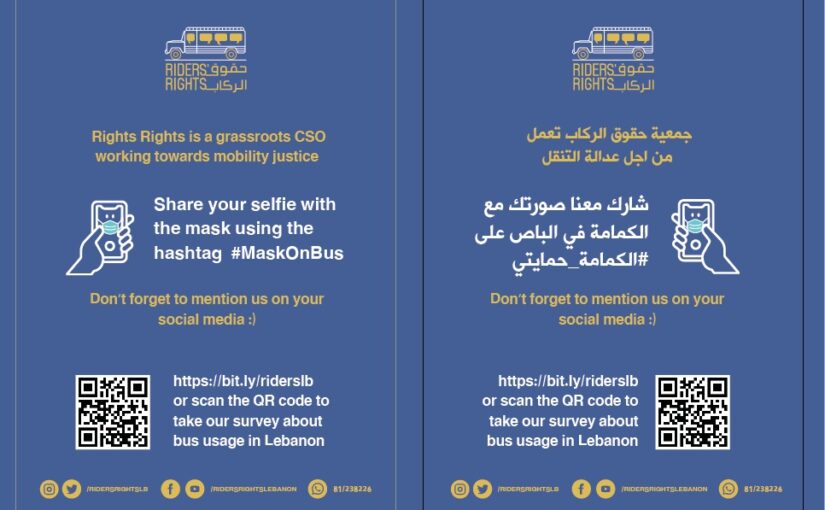By Lara el Sayegh
When Covid 19 occurred in Lebanon, the country was already suffering from a severe socio-economic crisis.
The lockdown measures taken by the Lebanese government to stop the spread of the coronavirus on March 15, 2020, did not address the economic situation of the informal transit system including taxis, private buses, vans drivers and operators.
It rather took the decision to stop all its operations in the country resulting in a severe loss of livelihoods for thousands of bus and van drivers who survive on a daily income.
The lockdown measures also had a negative impact on the mobility of frontline workers, not mentioning that it was not adapted to the needs of specific groups such as people with disabilities.
When lockdown measures were loose, the transit system was still suffering from low ridership due to the health risks linked to coronavirus and the lack of safety instructions and materials.
To support drivers and riders in this helpless situation facing drivers, Riders Rights started working, in cooperation with MSF, on the informal transit system.
2. Training and PPE distribution with MSF (July 2020):
Before going on the field, it was obvious that RR’s volunteers needed to be trained by health experts, that’s how RR had an agreement with MSF who agreed to cooperate, and conducted a training on best practices for field work and generally during COVID-19 times, on July 24th 2020.
When we asked Hoda, MSF volunteer, about our collaboration she said: « I was impressed when I learned about RR important mission to contribute to bus drivers and riders well being, and their extensive knowledge about drivers, buses and routes. »
As we attained further knowledge about the virus for the RR team, it led to the creation of a protocol for the bus system.
Then, also in partnership with MSF, RR produced and organized for 3 days in July 2020, three protocol trainings and distributed PPE equipment, including sanitizing materials and face shields, to 75 bus drivers, working on bus lines 2, 5 and 12 running through Hamra for 3 days.
Hoda noticed that « some drivers were so concerned and interested to listen to advices, that they executed the instructions on the spot! »
Protocol flyers were also distributed to drivers and riders, and copies were placed by our team in buses and other strategic locations for maximum exposure.
Ali Hamed, a Health promoter and MSF volunteer, found that « this kind of project should be initiated again in the future, especially nowadays, to increase drovers and riders acceptance rate for the Covid-19 vaccine. »
3. Outreach with drivers syndicates and bus riders
We discussed with two drivers’ syndicates about their feedback on the drafted protocols, about future collaborations as well as about the potential of distributing the protocol to taxi and « services » (shared taxis) drivers.
We purchased a small quantity of PPE and received a small donation for face shields which were distributed on several occasions at the main bus hubs primarily for drivers.
For Abou Tarek, driver, it was a great experience: « I am so grateful for this useful and excellent initiative, especially for the prevention advices, and most of all the concern shown by Riders’ Rights. My colleagues and I are still talking about it months after the training, and are wishing another training is organized. »
Drivers’ packages included: textile masks and tissues to clean the bus, Drivers’ protocols flyer, Rubbing alcohol, Small chlorine and Sanitizer bottles
Riders’ packages included: a textile mask, a Sanitizer bottle and a Rider flyer.
We also designed one survey for the drivers and one for the riders and conducted by our team whilst maintaining social distance.
4. Challenges faced during activities implementation
The Beirut explosion on 4 August once again created significant distress and disruption, COVID-19 prevention was put aside, as many prioritized supporting people and businesses affected by the explosion, including MSF. The training was therefore put on hold, and simply continued with the distribution of the protocol with a small statement for drivers.
Due to the threat posed by COVID-19 currently, we have reduced our field team to 2-3 persons and have to conduct our survey over the phone.
According to one of our volunteers, Farah, a Landscape architect interested in the shared transit system in Lebanon, « drivers are lacking basic and essential needs like of A/C, hygiene and Corona safety measures. If we improve bus conditions, people won’t be afraid to take buses anymore. »
Early November 2020, a meeting with our contact person in Hadath Municipality was delayed as he had contracted COVID-19, followed by another nationwide lockdown.
UpdatesCurrently, we are hoping to plan with Hadath Municipality, roads stations to distribute to drivers Covid code and protocol including packages.
We will tell you about it in the next blog post! Stay tuned!
